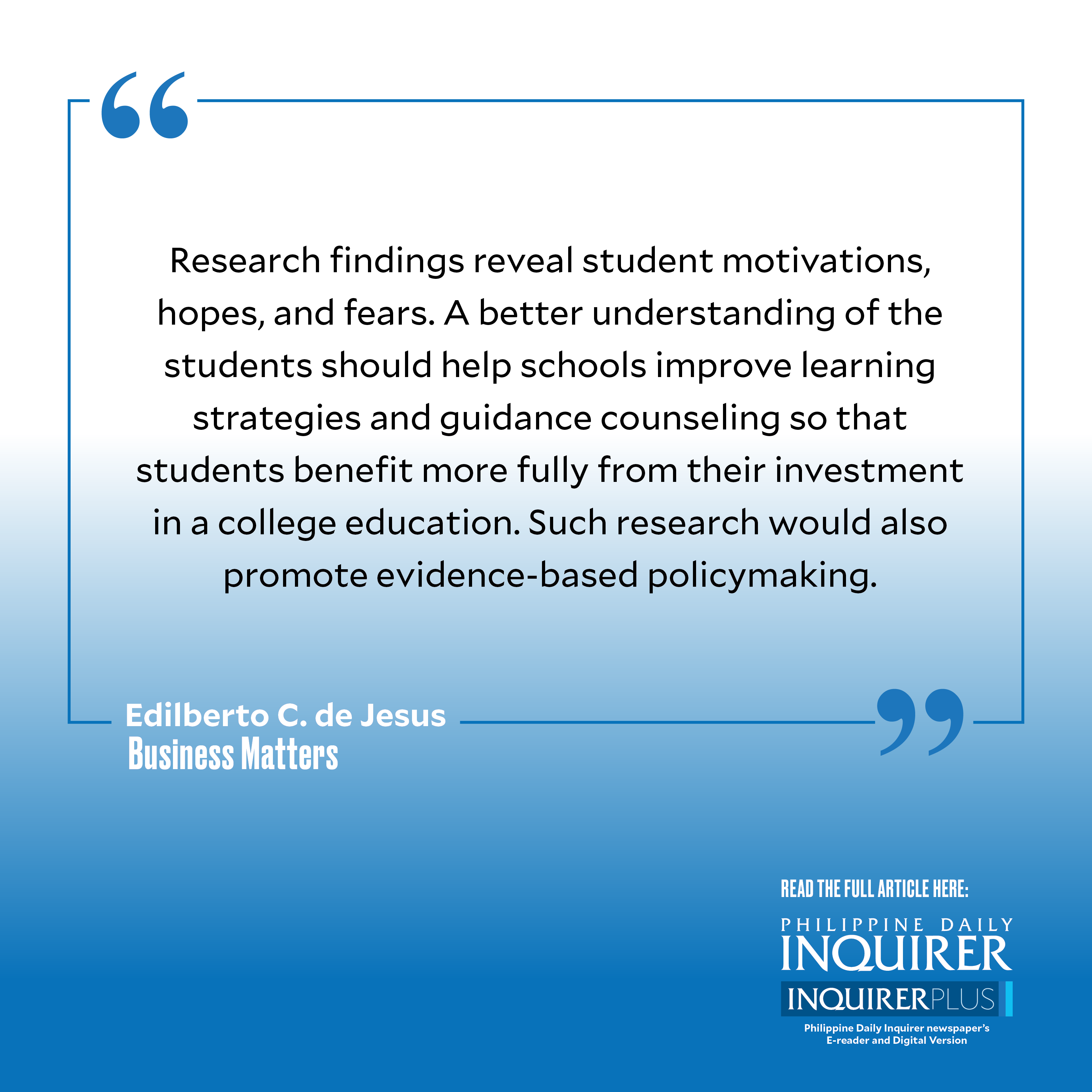Understanding students
Over 75 percent of the freshmen surveyed by the Far Eastern University Public Policy Center (FPPC) in 2022 expressed concern over the financing of their college education, with nearly 40 percent describing it as a major issue. However, 31 percent declined to provide information on family income. Another 30 percent of the respondents reported a P40,000 monthly income that FPPC believed was probably understated. But it would not be easy to complete a private school college education, even doubling the income to P80,000/month; students’ feelings of insecurity about finances are understandable.
Surveys of basic education graduates who did not continue to college have offered different reasons for their decision, including the desire to pursue immediate income- generating opportunities. The factor more often cited was lack of interest in further classroom education, to which their poor experience with basic education and learning outcomes doubtless contributed. Reluctance to reveal the family’s financial condition shown in the FPPC survey, however, cautions against accepting at face value claims that lack of interest, rather than lack of funds, was their reason for forgoing college.
Article continues after this advertisementOn another survey item, less than 3 percent of the respondents reported English as the language spoken at home. For 87 percent, Tagalog was the home language; not surprising since most of the 15 colleges participating in the survey were in the National Capital Region and 85 percent of the respondents were permanent residents of Metro Manila, Calabarzon, and Central Luzon. These findings, presented by FPPC president Michael Alba at a forum jointly convened in July with the Harvard Kennedy School Alumni Association, illustrate how survey research might inform government policymaking.
Partly compensating for the limited scope of the survey, the forum featured a panel of discussants with academic training and extensive education experience to reflect on the relevance of the findings to the broader national situation: former Commission on Higher Education (CHEd) chair and president of Miriam College, Patricia “Tattie” Licuanan; former labor attaché in Japan, Kuwait, and Iran, now University of the Philippines president Angelo Jimenez; and Francisco Benitez, former president of Philippine Women’s University and currently representing the third district of Negros Occidental in the House of Representatives.
The panel acknowledged that some student concerns were new, such as those provoked by the impact of climate change, and social media. Others, like college financing, were disappointingly familiar; Tagalog movies from the ’50s on retold the familiar narrative of families selling the last piece of land or carabao to raise enrollment money.
Article continues after this advertisementWhile acknowledging its laudable objectives, the panel agreed that Republic Act No. 10931, or the Universal Access to Quality Tertiary Education Act, needed a review. Passed despite the objections of CHEd and both public and private education stakeholders, the law’s objective of universality was recently declared unsustainable by the Department of Finance; only 17 percent of the youth from the poorest decile gained access to college.
Globalization offered new opportunities; 86 percent of the respondents declared their intention to work abroad, reflecting the weaker pull of family links, or, perhaps, the push from the family itself. Gen Z freshmen appeared to suffer from greater stress than their elders. Forty percent admitted a lack of resilience, a readiness to give up when faced with difficulties. They were not confident about their reading of external events and seemed unsure even about their own capabilities. Those who were middling performers in senior high school expected to do better in college. Those who tracked better-than-average performance feared that they would not do as well.
Not surprisingly, the survey showed respondents “shying away from intellectually challenging and contentious issues.” Perhaps, this sense of insecurity contributed to a notable difference with the 2015 freshman class. For this older cohort, raising a family was an important aspiration. Less than 60 percent of the 2022 freshman class considered this objective “important” or “somewhat important.”
The 2022 survey is part of the ongoing FPPC program, running now for almost 10 years, to track the expectations and experience of students as they move from freshman year to graduation. Research findings reveal student motivations, hopes, and fears. A better understanding of the students should help schools improve learning strategies and guidance counseling so that students benefit more fully from their investment in a college education.
Such research would also promote evidence-based policymaking. If more schools conducted comparable surveys on their own or participated in the FPPC program.
—————-
Edilberto C. de Jesus is professor emeritus at the Asian Institute of Management.
—————-
Business Matters is a project of the Makati Business Club ([email protected]).
















